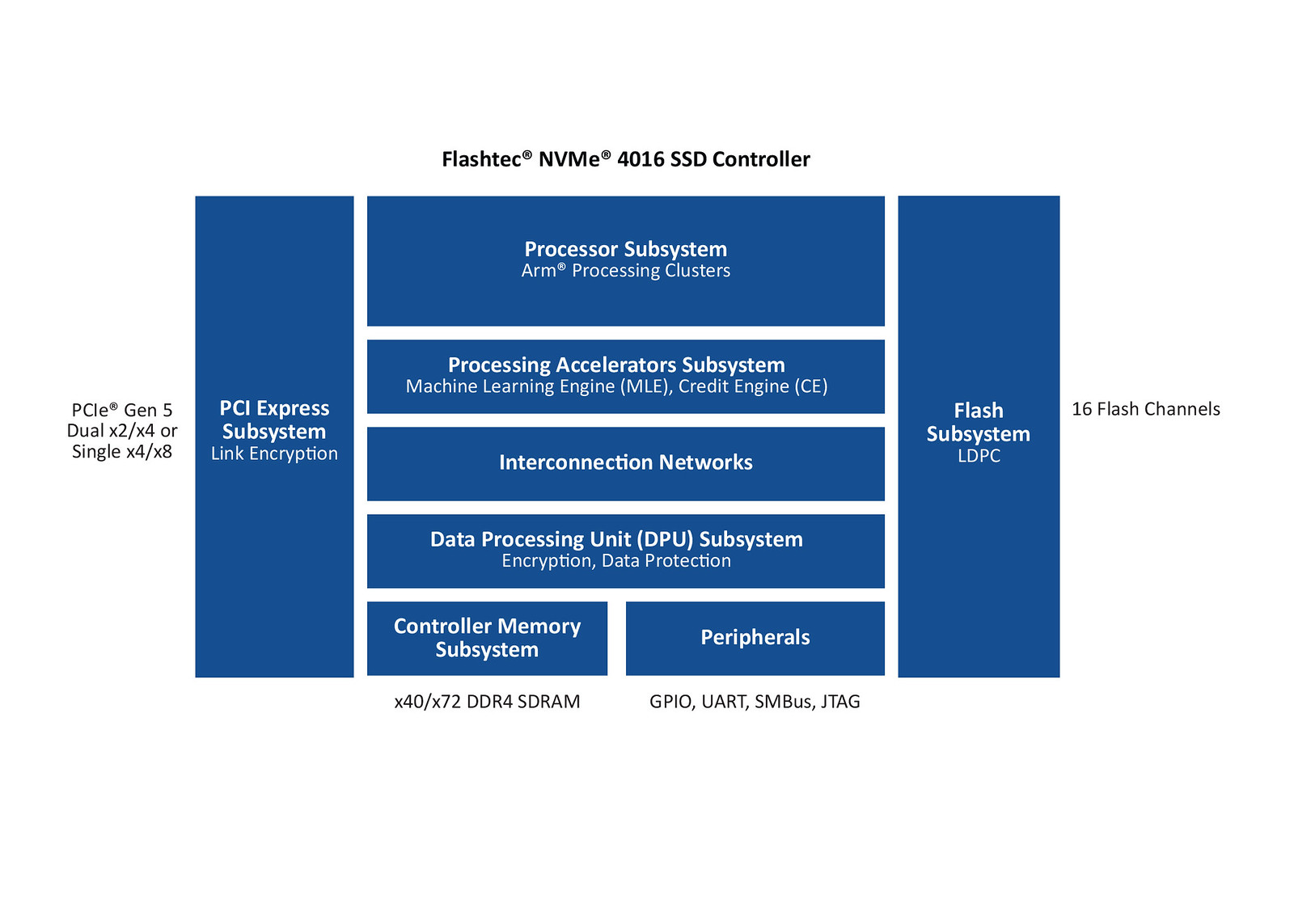Microchip's New SSD Controller Enables 200TB Data Center PCIe 5.0 Drives
The Flashtec NVMe 4016 controller makes PCIe 5.0 x8 SSDs with 3 million-plus IOPS a possibility.
Get Tom's Hardware's best news and in-depth reviews, straight to your inbox.
You are now subscribed
Your newsletter sign-up was successful
Microchip has unveiled its new SSD controllers that will enable the creation of storage devices featuring unprecedented capacity and performance. The company's Flashtec NVMe 4016 controller will empower drives with a PCIe 5.0 x8 interface that will offer 200TB of storage space along with 14 GBps throughput and over 3 million random read IOPS.
Microchip's Flashtec NVMe 4016 is an NVMe 2.0-compliant SSD controller featuring 16 NAND channels as well as a PCIe 5.0 x8 host interface (or dual independent PCIe Gen5 x4) featuring a maximum raw bandwidth of up to 31.5 GBps in each direction. The processor is designed to build next-generation SSDs for cloud datacenters running AMD's EPYC 'Genoa' as well as Intel's Xeon Scalable 'Sapphire Rapids' processors that will require ultra-fast and ultra-dense storage options.
Those machines with their extreme core counts will need SSDs that can feed them data at over 14 GBps sequential speed (enough to easily beat all current drives on our best SSDs list). In fact, a PCIe 5.0 x8 interface can enable even higher bandwidth, but since we are talking about enterprise-grade SSDs, it will be up to their manufacturers to tune for maximum sequential or random read/write speeds, depending on the types of workloads.
The Flashtec NVMe 4016 features sophisticated LDPC-based bit error correction capabilities to handle contemporary and upcoming 3D SLC/MLC/TLC/QLC NAND memory with ever-increasing bit densities. Microchip does not disclose which cores it uses for the Flashtec NVMe 4016, but says it has several 'high-performance' Arm processing clusters with advanced power management features, which may imply use of Arm Cortex-R82 cores specifically designed for performance-hungry SSD controllers. In particular, the model 4016 supports the so-called 'credit engine,' for dynamic allocation of resources to enable optimal on-demand cloud services. Furthermore, the IC supports machine learning enhancements
In addition, the Flashtec 4016 controller supports all modern security capabilities, including secure boot, double signing authentication, integrity and data encryption (IDE), single-chip hardware root-of-trust, and FIPS 140-3 Level 2 compliance.
Also, the controller supports NAND interfaces with data transfer rates of up to 2400 MTps and therefore all types of existing NAND flash memory devices (with an up to 2000 MTps I/O) as well as future ICs with a faster Toggle or ONFI interface. Supporting future 3D NAND types of flash memory is important to even higher-capacity drives.
Speaking of capacity, note that the controller is designed for SSDs in a variety of form-factors, including E3, U.2, U.3, and PCIe add-in cards. Some of these form-factors allow for build drives supporting over 200TB of NAND flash storage space.
Get Tom's Hardware's best news and in-depth reviews, straight to your inbox.
It may be hard to imagine a solid-state drive holding 200TB of data, but operators of modern hyperscale datacenters sometimes need hardware featuring a combination of capabilities that has never been seen before. Hyperscalers are among the key target markets for SSDs based on Microchip's Flashtec NVMe 4016 controller, so a 200TB capacity along with zoned namespace support do not seemtoo out of the question.
It is noteworthy that the Flashtec NVMe 4016 controller has been endorsed by a host of server platform developers, datacenter SSD makers, server manufacturers, and hyperscalers, including AMD, Intel, Kioxia, SK Hynix, Solidigm, and Meta (formerly Facebook).

Anton Shilov is a contributing writer at Tom’s Hardware. Over the past couple of decades, he has covered everything from CPUs and GPUs to supercomputers and from modern process technologies and latest fab tools to high-tech industry trends.
